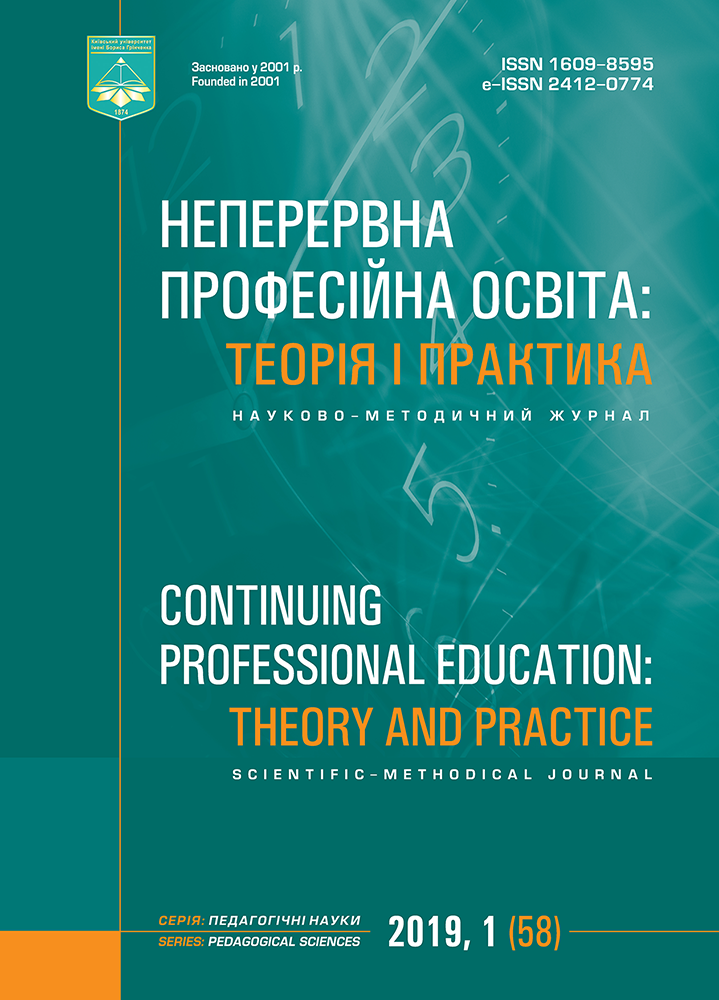COMPETENCE ORIENTED TASKS IN FORMATION OF FUTURE SOFTWARE ENGINEERS PROFESSIONAL COMPETENCES
DOI:
https://doi.org/10.28925/1609-8595.2019.1.4652Keywords:
competence oriented tasks, professional competences, short-term education, software engineerAbstract
The actual direction of research in the field of higher professional education is the improvement of the quality of future software engineers’ professional training in a reduced period of study at universities. This is due to contradictions between the list of competencies defined in curricula, fewer numbers of disciplines in the curriculum and the competencies already available to students. We believe that competence oriented tasks are means to gain this point. Such tasks involve the organization of students self-work to solve professional problems. This orientation motivates undergraduates to cognitive activity and contributes to the formation of professional competencies. The purpose of this article is to analyze the use of competence oriented tasks in the process of future software engineers’ short-term training at universities. Scientific publications devoted to various aspects of the use of competence oriented tasks in the training process are analyzed. Their definition, classification, structure, and recommendations for design are given. The concept of professional competence by definition of the TUNING project and professional competence of the software engineer in particular are considered. The characteristics that allow to consider competence oriented tasks as means for formation and evaluation of future software engineers professional competencies are determined. Examples of such tasks aimed at the formation and evaluation of the level of professional competencies in «Programming» course are given. Further research is aimed at evaluation the effectiveness of the implementation of educational and criterion functions of these ones in the training of future software engineers.References
Ahmadullina, R. M., & Valiahmetova, N. R. (2012). Konstruirovanie kompetentnostno-orientirovannyh zadanij v processe professional’no-pedagogicheskoj podgotovki studentov [Designing competence-oriented tasks in the process of students’ professional and pedagogical training]. Obrazovanie i samorazvitie, 4 (32), 49–54 (rus).
Zhukova, N. M., Kubrushko, P. F., & Shingareva, M. V. (2015). Mehanizm proektirovanija kompetentnostno-orientirovannyh zadach po uchebnym disciplinam i uslovija ego realizacii v vuzah [Mechanism for designing competence-oriented tasks in various academic subjects and requirements for its implementation in higher educational establishments]. Obrazovanie i nauka, 1 (120), 68–79 (rus).
Taras Shevchenko National University of Kyiv (2019). Pravyla pryiomu do Kyivskoho natsionalnoho universytetu imeni Tarasa Shevchenka u 2019 rotsi [Rules of admission to Taras Shevchenko National University of Kyiv in 2019]. Kyiv, Ukraine: Taras Shevchenko National University of Kyiv. Retrieved from http://vstup.univ.kiev.ua/ userfiles/files/Pravula2019.pdf (ukr).
Kruhlyk, V. S. (2017). Systema pidhotovky maibutnikh inzheneriv-prohramistiv do profesiinoi diialnosti u vyshchykh navchalnykh zakladakh: monohrafiia [System of preparation of future programmers-engineers for professional activity in higher educational establishments: monograph]. Melitopol, Ukraine: Bogdan Khmelnitsky Melitopol State Pedagogical University (ukr).
Ivan Franko National University of Lviv. (2019). Pravyla pryiomu do Lvivskoho natsionalnoho universytetu imeni Ivana Franka – 2019 [Rules of admission to Ivan Franko National University of Lviv – 2019]. Lviv, Ukraine: Ivan Franko National University of Lviv]. Retrieved from http://admission.lnu.edu.ua/guide/guidelines-for-admission-2019/ (ukr).
Maximov, I. I., & Slovak, K. I. (2017). Kompetentnisno oriienovani zadachi z teorii ymovirnostei u pidhotovtsi studentiv inzhenernykh spetsialnostei [Competently oriented tasks on the theory of probabilities in teaching students of engineering specialties]. Cherkasy University Bulletin: Pedagogical Sciences, 12, 71–77 (ukr).
Mahotin, D. A. (2014). Kompetentnostno-orientirovannye zadanija kak sredstvo ocenki obshhih i professional’nyh kompetencij obuchajushhihsja [Competence-oriented tasks as a means of assessing the general and professional competencies of students]. Secondary vocational education, 5, 17–20 (rus).
Bogdan Khmelnitsky Melitopol State Pedagogical University. (2019). Pravyla pryiomu na navchannia do MDPU imeni Bohdana Khmelnytskoho [Rules of admission to Bogdan Khmelnitsky Melitopol State Pedagogical University].
Melitopol, Ukraine: Bogdan Khmelnitsky Melitopol State Pedagogical University. Retrieved from http://vstup. mdpu.org.ua/vstup/vstup-2019/ (ukr).
Ministry of Education and Science of Ukraine (2018). Umovy pryiomu na navchannia do zakladiv vyshchoi osvity Ukrainy v 2019 rotsi [Conditions for admission to the higher education institutions of Ukraine in 2019]. Ministry of Education and Science of Ukraine Decree, October 11, 2018, № 1096. Retrieved from https://mon.gov.ua/ storage/app/media/news/Новини/2018/12/28/priyomu-2019.pdf (ukr).
Morze, N. V., & Kuzminska, O. H. (2008). Kompetentnisni zadachi z informatyky [Competency tasks in informatics].
Scientific journal of National Pedagogical Dragomanov University. Series 2. Computer-Oriented Learning Systems, 6 (13). Retrieved from http://www.fi.npu.edu.ua/zbirnyk-kosn/48-zbirnyk-13 (ukr).
Lviv Polytechnic National University. (2019). Pravyla pryiomu na navchannia do Natsionalnoho universytetu «Lvivska politekhnika» u 2019 rotsi [Rules for admission to Lviv Polytechnic National University in 2019]. Lviv, Ukraine: Lviv Polytechnic National University. Retrieved from http://lp.edu.ua/pryymalna-komisiya/pravyla-pryyomu (ukr).
Fasolia, A. (2014). Kompetentnisno zoriientovani zavdannia: novatsiia? Imitatsiia? [Competence-oriented tasks: innovation? Imitation?]. Ukrainian literature at a secondary school, 5, 14–20 (ukr).
Khomiuk, V. V., & Khomiuk, I. V. (2017). Kompetentnisno oriientovani zavdannia yak vazhlyvyi chynnyk formuvannia kohnityvnoi skladovoi matematychnoi kompetentnosti maibutnikh inzheneriv [Competence-oriented tasks as an important factor formation cognitive component mathematical competence of future engineers]. Topical issues of natural science and mathematics education, 9, 107–113 (ukr).
Shehonin, A. A., Tarlykov, V. A., Kleshheva, I. V., Bagautdinova, A. Sh., Bud’ko, M. B., Bud’ko, M. Ju., … & Orlova, O. Ju. (2014). Kompetentnostno-orientirovannye zadanija v sisteme vysshego obrazovanija [Competence-oriented tasks in higher education]. Saint-Petersburg, Russia: NIU ITMO (rus).
Shingareva, M. V. (2012). Proektirovanie kompetentnostno-orientirovannyh zadach po uchebnym disciplinam vuza [Designing competence-oriented tasks in academic disciplines of the university]. Extended abstract of candidate’s thesis. Moscow, Russia (rus).
Bloom, B. S. (Ed.), Engelhart, M. D., Furst, E. J., Hill, W. H., & Krathwohl, D. R. (1956). Taxonomy of Educational Objectives: The Classification of Educational Goals. Handbook 1: Cognitive Domain. New York, USA: David McKay (eng).
González, J., & Wagenaar, R. (Eds.). (2008). Universities’ contribution to the Bologna Process: An introduction.
Bilbao, Spain: la Universidad de Deusto. Retrieved from http://www.unideusto.org/tuningeu/images/stories/ Publications/ENGLISH_BROCHURE_FOR_WEBSITE.pdf (eng).
Selby, C. C. (2015). Relationships: Computational Thinking, Pedagogy of Programming, and Bloom’s Taxonomy. In Proceedings of the Workshop in Primary and Secondary Computing Education, WiPSCE ‘15 (pp. 80–87). New York, USA: ACM. DOI: 10.1145/2818314.2818315 (eng).
Downloads
How to Cite
Issue
Section
License
Copyright (c) 2020 Iryna Krasheninnik

This work is licensed under a Creative Commons Attribution-NonCommercial 3.0 Unported License.



